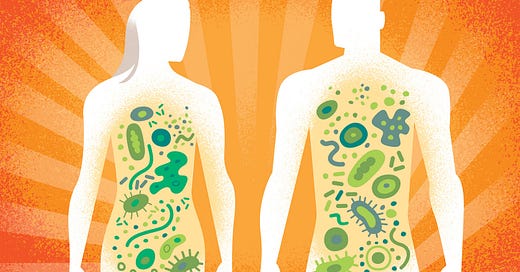First a look at coeliac disease, antibiotic use and the microbiome;
Early-life origin of intestinal inflammatory disorders ‘Epidemiological studies have highlighted the link between perinatal factors, such as breastfeeding, cesarean delivery, and antibiotic use, and an increased risk for inflammatory bowel disease and/or celiac disease.’
Association of maternal education, early infections, and antibiotic use with celiac disease: a population-based birth cohort study in northeastern Italy ‘Antibiotic use was significantly associated with Coeliac Disease onset with a dose-response relationship for number of courses. Cephalosporin use strongly increased the risk of CD (IRR = 1.42, 95% CI: 1.18, 1.73). Use of antibiotics (supported by the dose-response relationship)… may facilitate the early onset of CD by altering intestinal microflora and the gut mucosal barrier.’
Initial intestinal colonization in the human infant and immune homeostasis ‘The paradigm of disease burden in the developed world has changed drastically in the last few decades from predominately infections to immune-mediated diseases (autoimmunity and allergy) because of alterations in the Western lifestyle (improved sanitation, immunizations(!!), antibiotic usage and altered dietary intake). A diverse balanced microbiota is necessary for the development of an appropriate innate and adaptive immune response. There is strong evidence that disruption of the normal colonization process can lead to alterations in the important symbiotic relationship that is necessary for immune homeostasis. For example, infants born by cesarean section or receiving excessive perinatal antibiotics have inadequate initial colonization and aberrant mucosal immune function. As a result, later in childhood, they express an increased incidence in asthma and autoimmune diseases (e.g. celiac disease). An important component of initial colonization is the infant's diet. Breast milk contains a variety of nondigestible oligosaccharides which function as prebiotics preferentially stimulating proliferation of Bifidobacteria and Lactobacilli, important health-promoting bacteria, and cause fermentation of the oligosaccharides into short-chain fatty acids.’
Effects of glyphosate;
Glyphosate acts as an antibiotic and beneficial bacteria are particularly susceptible to it. Beneficial bacteria thrive on fibre and indigestible starches only found in plants. Glyphosate alters the gut microbiome and causes a deficiency in butyrate which is the colonocytes preferred food. With well-nourished colonocytes protect the gut barrier and prevent inflammatory proteins and lipopolysaccharides from entering the blood stream.
Effect of gluten;
Exposure to gluten after a course of peri-natal ‘just in case’ antibiotics, lack of exposure to vaginal juices after a C section, or formula feeding and subsequent lack of resistant starches found in human breast milk causes inflammation. The gut is not lined by protective, beneficial bacteria. The body is not ‘taught’ correctly and then regards the gluten as a poison to be expelled. The explains why a gluten free diet controls the symptoms in about 70%- though there are considerable risks with gluten free diets.
Other changes in the body such as the n-acetylaspartate/creatinine ratio in the brain, thought to be involved in memory, may increase with improvement in overall diet quality on a GFD and not because of the absence of gluten itself.
The presence of ‘auto’ antibodies in the blood;
The presence of antibodies to gluten, gliadin, thyroxine, insulin or any other protein does not indicate that the body is attacking itself. The detection of antibodies indicate the recognition and binding to proteins where they should not be; in the blood, brain and organs, caused by leaky gut following dysbiosis.
Recommended treatment;
The treatment includes avoiding vaccines, glyphosate, polysorbate 80, medications and antibiotics. Protecting the barrier functions by supporting the microbiome with organic whole foods, fibre and indigestible starches and supporting the body with clean water, anti-oxidants and anti-inflammatory foods, again found in a plant rich diets.
Not recommended treatment';
The body does not need ‘immunosuppression’; that is interference with its healing and detox system. Please don't treat any ‘autoimmune’ disease, Crohn’s, rheumatoid arthritis, coeliac or ‘covid’ with monoclonal antibodies, this is madness! The antibodies, for example in tocilizumab for RA, bind to and block the interleukin-6 receptors, supposedly to suppress inflammation. In reality it suppresses the finely tuned positive and negative feedback loops, healing, detoxification and homeostasis. Monoclonal antibodies will have many serious side effects and are not treating the cause of the symptoms.





Thank you for this. A doctor suggested monoclonal antibodies to control eczema for my child. Now they are treating children 6 months and older with the monoclonal antibodies (FDA approved this particular treatment for this age group just this year). My feeling is that it is a bad idea as we don’t understand much about the long term effects of these medications and it is very difficult to find information about them besides what the pharma companies selling them put out. We will see much more use of these biological medicines in the near future as they are becoming one of the ways to treat asthma and eczema as well.
Good stuff. Thanks! Hope your holidays are being good to you. xo